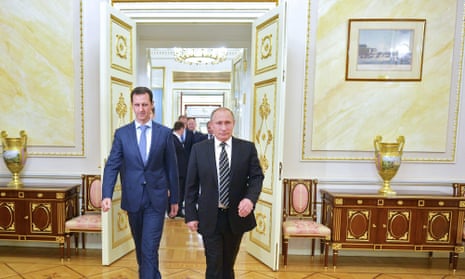It is now accepted by most independent commentators: Russia, or rather Vladimir Putin, has achieved an easy geopolitical coup in the Middle East. It has been allowed to do so primarily because of Washington’s weakness. Leaders of the most powerful country in the world have bottled out, albeit for understandable reasons.
The US, and the west in general, has now come under a devastating battering by one of its leading counter insurgency and counter terrorism advisers.
In Blood Year, published this week, David Kilcullen, frankly admits to serious strategic errors in countering terrorism . After ditching the problematic but unifying concept of a “War on Terrorism”, the west treated each problem as a stand-alone crisis. In contrast, Russia was treating Syria, Iraq, Crimea, Ukraine, the Baltic states and, even the Arctic, “simply as different facets of one strategic issue set”, writes Kilcullen.
It isn’t just Isis- al-Qaida has emerged from its eclipse and is back in the game in Afghanistan, Pakistan, India, Syria, Somalia and Yemen, he warns. But it is Isis which is pulling in large numbers of “foreign volunters”, many of them with no knowledge of Islam.
There is a risk of what Kilcullen calls “an Isis blitzkrieg” in Afghanistan next year that could “take us back to square one”, the kind of “terrorist safe haven” that existed there before 9/11.
He may be accused of scaremongering. Yet there is no evidence that western leaders have much of a clue about how to pursue an effective counter terrorist policy. Kilcullen argues that if the west withdraws from a ‘“forward strategy”, an alternative domestic defensive strategy “might turn our societies into police states”.
A purely defensive stance, Kilcullen warns, would have to include more intrusive powers of arrest and surveillance, more heavily armed police forces, more permissive rules for the use of lethal force, a raft of limitations on assembly and use of public spaces.
Meanwhile in Britain, Michael Fallon is visiting the Falklands, the first defence secretary to do so for 14 years. Why now, just at a time a more conciliatory Argentine president, Mauricio Macri, has come to power?
The Foreign Office is reported not to be best pleased. The visit is probably more to do with seizing an opportunity to have another go at Jeremy Corbyn.
The Labour leader has repeatedly called for a “negotiated” settlement with Argentina over the Falklands, something advocated by successive British governments, including the Thatcher administration even after the 1982 invasion of the islands.
Fallon has revelled in attacks on Corbyn , not least over Trident. Emily Thornberry, Labour’s defence spokesperson, has suggested a new Trident submarine fleet could be vulnerable to such weapons as underwater drones by the time the subs get to sea in the 2030s.
The Commons defence committee, whose Tory chair, Julian Lewis, is strongly pro-Trident renewal, in marked contrast to Crispin Blunt, Tory chair of the Commons foreign affairs committee - has now asked BAE and Bacock, builders of the submarines, a number of leading questions.
The defence committee has asked “whether new technologies, for example underwater drones, are being developed which could accurately detect and track submarines”, the feasability of such systems being effective, and what “advancements in submarine design are being considered to combat detection by such equipment.”
It will be interesting to see how the answers dismiss any such threats to a new Trident fleet.

Comments (…)
Sign in or create your Guardian account to join the discussion